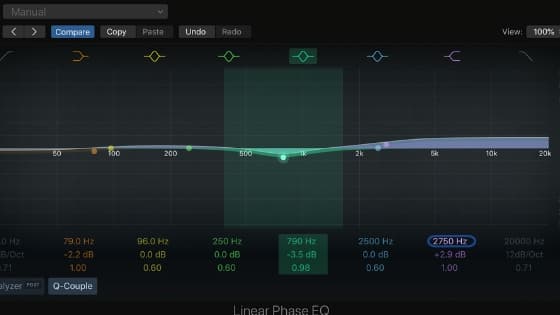
Linear Vs Minimum Phase EQ – When To Use Which
What’s the difference?
First of all, let’s discuss what an EQ is and how it works.
An EQ is a frequency balancer. Think of it like a mixing desk for frequencies. Each “fader” is a volume control for a particular band of frequencies.
Its purpose is to make relative volume changes between frequencies with a view of correcting or sculpting the tonal response of the signal. It doesn’t add or take frequencies away, it just turns them up or down.
How does an EQ work?
Well, the engineering behind an EQ is well above my pay-grade. However, what you should know is that it’s in the very nature of an EQ to manipulate phase.
“If you combine a signal with a phase shifted version of itself (after passing through the capacitor or inductor), the frequency response is altered.” Ethan Winer, EthanWiner.com
That’s the most basic version of how we use phase to alter the frequency balance of a signal. An EQ is a very complex version of this. In the above quote, Ethan refers to comb filtering. Try it for yourself!
Minimum Phase vs Linear Phase EQ
All EQs shift the phase of the signal. There’s no getting around that. So the only difference is how it shifts the phase and how that effects the frequency response of the signal.
Minimum phase EQs move the relative phase between frequencies. For example, if you were mastering an orchestra using a minimum phase EQ, it would change the phase (time) relationships between frequencies.
This could manifest as a time shift between different sections of the orchestra, harmonics within an instrument, or intervals between reflections in the space. All of which could theoretically smear the image and the staging of the mix.
Enter, Linear Phase
Linear Phase EQs work to resolve this issue, but they are not without their own drawbacks. The phase-shift of a linear EQ is linear across frequencies. Meaning that if you turn down 4k, the phase relationships between that frequency and neighbouring ones would remain intact. So in the example of an orchestra, there would be no smearing.
However, it does have one drawback. Pre-ringing.
Think of pre-ringing as a reverse-echo effect in the signal. It’s usually very hard to hear, but it is theoretically happening. As far as our ears are concerned, it’s not always an issue, but if you are EQing the low end of an EDM master, it could be a problem. This is due to the pre-echo softening the transient of the kick drum, which is far from ideal in dance music.
If you would like to hear a comparison in action, check out this thread, second post down for some audio examples.
So which one do I use?
There is no perfect instrument. Many will have you think Linear is better for mastering, but that’s not necessarily true. As always, you have to know the tools, their respective pros and cons, and deploy the best tool for the job at hand.
This article was brought to you by Songcards
© 2025 Unlock Your Sound Ltd | Privacy Policy